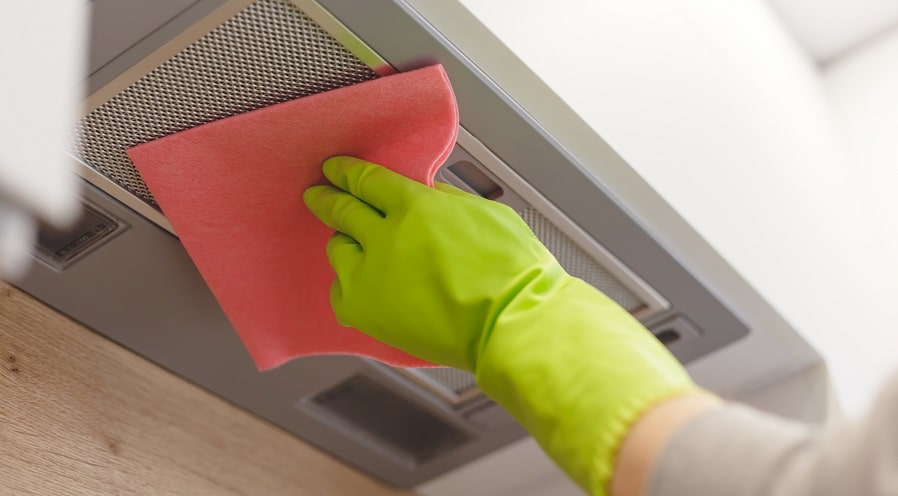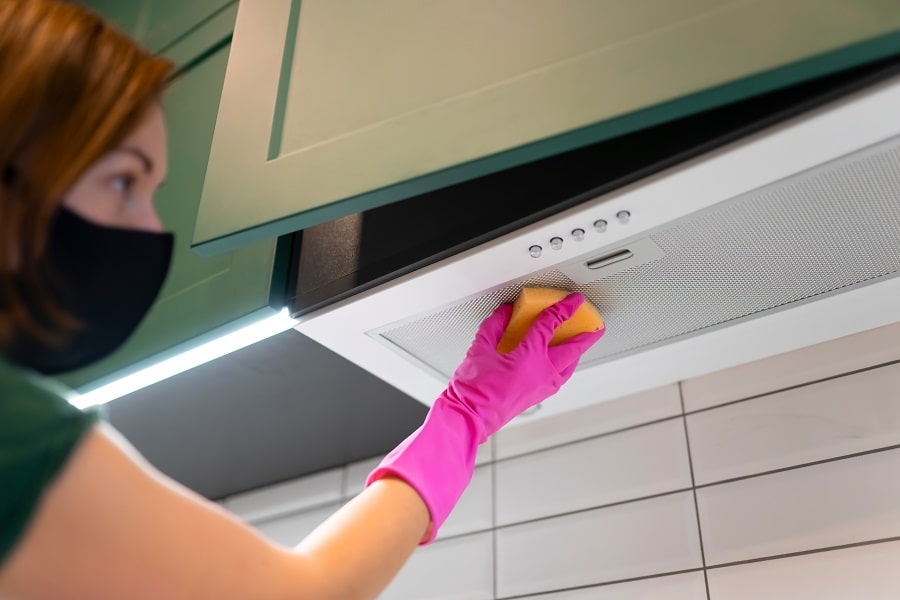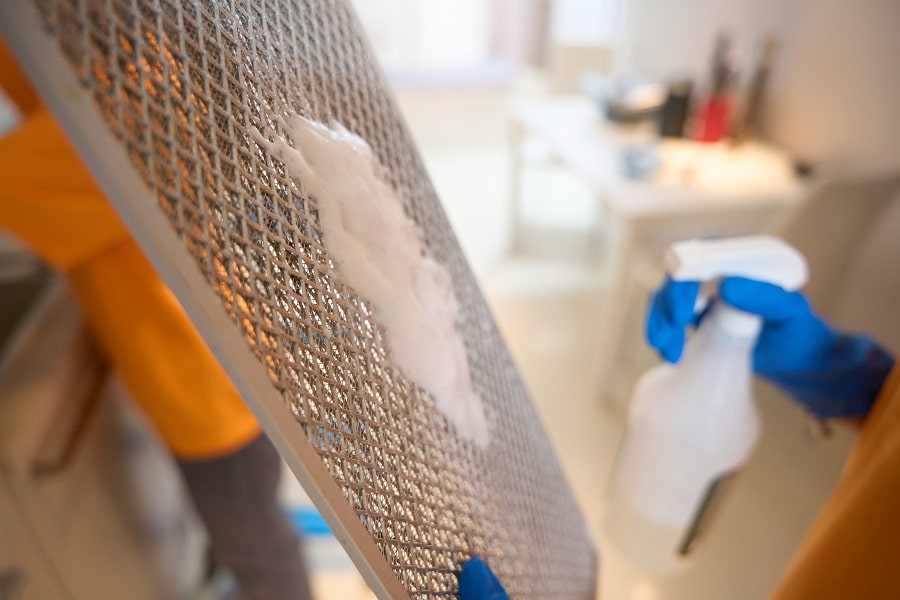
Effective tips for cleaning cooker hoods
Extractor hoods ensure that vapors, fats and odours are efficiently removed during cooking. However, for them to perform at their best, regular cleaning is required. In this article, we provide tried-and-tested tips for keeping your extractor hood in tip-top condition.
Clean your range hood
Cleaning your range hood regularly is not only important to improve the air quality in your kitchen, but also to extend the service-life of the appliance and minimize potential safety hazards. For example, a neglected range hood can not only affect the freshness of the air in your kitchen, but also increase the risk of fire. By following our simple tips, you can ensure that your range hood always stays in top condition and works efficiently.
For example, do you have a sticky range hood which needs cleaning? But you are not sure which cleaning agents are best suited for this? Then keep reading!
The best cleaning agents for cooker hoods
A range hood is an essential device in any kitchen, effectively removing fumes, grease and odours. But while it does its job, the hood often faces an inconvenient side effect - a buildup of grease and grime that, over time, can compromise the efficiency of the appliance. Regular and thorough cleaning is therefore essential. To make this task easier, we take a look at the best cleaning products for range hoods that will help you restore your kitchen back to its clean and shiny state in no time.
- Degreasing Sprays: Degreasing sprays are a popular choice for cleaning range hoods because they are specially formulated to effectively loosen grease and grime. These sprays are usually easy to use - simply spray on the dirty surface, let it work for a short time, and then wipe off with a cloth or sponge. Be sure to choose a product that is designed to be grease-dissolving and compatible with your surfaces at the same time.
- Grease-dissolving cleaners: Grease-dissolving cleaners are another effective option for cleaning range hoods. They usually contain enzymes or surfactants that can break down and dissolve grease. These cleaners are often versatile and can be used on other kitchen surfaces
- Natural cleaners:For those who prefer more environmentally friendly options, there are natural cleaners such as vinegar, lemon juice and baking soda. Vinegar can dissolve grease and neutralize odors, while lemon juice has disinfecting properties. Baking soda is abrasive enough to remove stubborn stains without damaging surfaces. These natural remedies may require a little more scrubbing, but are a great option for those who want to avoid chemicals.
- Fume Hood Cleaners: There are also special cleaners for range hoods available on the market. These products are often tailored to the needs of these specific devices and can effectively remove stubborn deposits without damaging the surfaces. They may come in the form of gels, foams or wipes and often specialize in removing grease.
- Microfiber cloths and sponges: Regardless of the cleaning agent chosen, microfiber cloths and sponges are indispensable aids in cleaning range hoods. Microfiber cloths can effectively absorb grease and dirt without leaving scratches on the surfaces. Combined with the right cleaning agent, they provide an effective method of removing dirt.
Before you start cleaning your range hood, it's a good idea to check the manufacturer's instructions to make sure the cleaning products and methods you choose are appropriate for your particular model. In addition, it is advisable to maintain a regular cleaning schedule to ensure optimal functioning of the range hood.
Clean the cooker hood filter

One of the most important components of a range hood is the filter. Extractor filters play a crucial role in improving the air quality in the kitchen by filtering pollutants and unwanted particles from the air. Different types of filters are used in range hoods to effectively remove different types of contaminants. We will now take a look at the most common haze hood filters:
Clean a range hood grease filter:
The grease filter, also called a metal grease filter, is one of the most basic types of filters in a range hood. Its main function is to capture grease and oil particles from the rising steam and smoke. These extractor hood filters are often made of aluminum or stainless steel and have dense louvers or grilles that trap the particles. A grease filter should be cleaned or replaced regularly to ensure efficient performance of the range hood. We will dicuss the cleaning of a metal grease filter in more detail in the next section.
Cleaning the active carbon filter cooker hood:
Active carbon filter, also known as odor filter or carbon filters, are responsible for reducing unpleasant odours. They are made of porous carbon that absorbs and neutralizes odor molecules. Activated carbon filters are especially useful in recirculating range hoods, which release the purified air back into the kitchen. Charcoal filters are not reusable. They must be replaced with new ones at regular intervals (depending on the frequency of use), as the activated carbon loses its absorption capacity over time.
At a time when sustainability and environmental awareness are becoming increasingly important, regenerable activated carbon filters have become a promising alternative. These filters are designed to be cleaned and reused rather than discarded after a limited lifespan. These regenerable filters are made up of high-quality activated carbon and a robust filter structure that allows the activated carbon to be regenerated by heating it, such as in an oven, to remove absorbed substances.
You can find a wide selection of reliable activated carbon filters, regenerable filters and other filter types here at Electropapa's online store.
Cleaning metal grease filters
Like all other extractor hood filters, a metal grease filter serves to trap grease and oil vapors before they can build up in the kitchen and on surfaces. In order for the range hood to function optimally and maintain air quality in the kitchen, regular cleaning of the metal grease filters is critical.
Cleaning the metal grease filters is a simple process, but it should be done carefully for best results:
- Turn off and allow to cool: Before you begin cleaning, make sure the range hood is turned off and the filters have cooled down completely to prevent burns.
- Remove filters: Depending on the model, extractor hood filters can be easily removed by turning, sliding or unlocking them. To do this, read the operating instructions for your cooker hood.
- Pre-treatment: Heavily soiled filters may benefit from pre-treatment. Place the filters in warm water with a grease-dissolving dishwashing liquid or a mixture of water and baking soda. This will help soften any dried grease.
- Soak: Let the filters soak for some time so that you can remove the grease more easily.
- Clean grease filters: After soaking, use a soft brush or an old toothbrush to carefully remove any remaining grease. Then rinse the range hood filter thoroughly under warm water to remove any soap residue.
- Let dry: Allow the cleaned filters to air dry thoroughly before reinserting them into the range hood.
- Reinsert: Once the extractor hood filters are dry, insert them back into the extractor hood and make sure they are secure and properly positioned.
Clean the cooker hood motor
The motor in a range hood pulls air through various kitchen exhaust filters and ducts to remove fumes, odours and grease. Over time, however, grease, dirt and debris accumulate in the motor and surrounding components. This can affect performance, reduce efficiency and even create a safety hazard, as the accumulation of grease is a potential fire hazard.
So now we'll show you step by step how to efficiently clean the motor in your range hood:
- Disconnect the power: Before you start cleaning, make sure the range hood is disconnected from the power supply to prevent accidents.
- Access to the motor: Depending on the model of the range hood, you may need to remove the cover or housing to access the motor. To do this, read your appliance's instruction manual to make sure you're following the correct steps.
- Vacuum or sweep: First remove loose debris, dust and dirt from the motor and surrounding areas. Use a vacuum cleaner with a brush nozzle or a soft cloth to remove the dirt.
- Prepare cleaning solution: Mix a cleaning solution of warm water and a mild dishwashing detergent or a special grease solvent. Then dip a soft cloth into the solution and wring it out well to avoid excessive moisture penetration.
- Gently wipe: Gently wipe the engine and adjacent surfaces with the dampened cloth. Avoid letting water get directly into the engine or other electrical components.
- Remove stubborn deposits: For stubborn grease buildup, you can use a toothbrush with soft bristles to gently scrub. However, do not use excessive force when doing so to avoid damage.
- Rinse and dry: Wipe off any soap residue with a clean, damp cloth and dry the cleaned areas thoroughly before reattaching the covers.
How often to clean cooker hood?
How often haze hood filters need to be cleaned depends on several factors, including the frequency of cooking and the type of dishes prepared. If you cook frequently and tend to fry your food, monthly cleaning of metal grease filters is advisable. Carbon grease filters should be replaced about every 3 to 6 months, as they become clogged over time and their absorption efficiency decreases.
Cleaning the motor is required less frequently, but is still important. A grimy motor can affect the performance of the range hood and even lead to premature failure. A good indication that the motor needs cleaning is an unusually loud operating noise. This could indicate that dirt or debris has accumulated in the motor. Cleaning the engine should be done by a professional to prevent damage.
A professional service of your range hood at least once a year is recommended. A professional can not only thoroughly clean the motor, but also check the general condition of the hood and replace any worn out parts in a timely manner.
Electropapa - Spare parts for your cooker hood

In addition to dirty filters, extractor hoods can also show other signs of wear over time. When this occurs, it's important to use quality replacement parts to maintain the performance and efficiency of your hood. This is where Electropapa comes in. With a wide range of spare parts and accessories for different brands and models of range hoods, Electropapa gives you the opportunity to easily replace broken parts or purchase new range hood filters.
So visit us today at our Electropapa online store and make sure your range hood stays in top condition.



